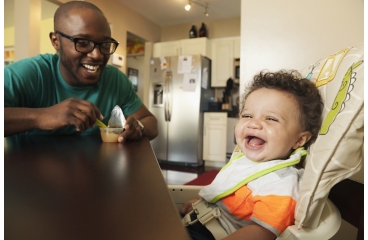Fish Allergy in Children: Care Instructions
Overview

When your child has a fish allergy and eats fish, your child's body reacts as if the fish causes harm. It
fights back by setting off an allergic reaction. A mild reaction may include a few raised, red, itchy patches
of skin (called hives). A severe reaction may cause hives all over, swelling in the throat, trouble breathing,
or fainting. It can also cause belly pain, nausea, vomiting, or diarrhea. This is called anaphylaxis (say
"ANN-uh-fuh-LAK-suss"). It can be deadly.
A good way to prevent your child's allergic reaction is to avoid the foods that cause it. Fish is in sauces
and salad dressings that contain fish sauce or anchovies. It is also often found in imitation shellfish, such
as crab. An allergy doctor or a dietitian may be able to help you understand which foods will be okay and what
to avoid. Learn what to do if your child has a reaction.
Follow-up care is a key part of your child's treatment and safety. Be sure to make and go to all
appointments, and call your doctor if your child is having problems. It's also a good idea to know your
child's test results and keep a list of the medicines your child takes.
How can you care for your child at home?
During a mild reaction
During a severe reaction
-
Give your child an epinephrine shot. Older children can give themselves the shot if they have learned how.
Keep it with your child at all times. Make sure it has not expired.
-
Call for emergency help. A severe allergic reaction can be life-threatening and is a medical emergency.
To prevent future reactions
-
Avoid the foods that cause problems. And try not to use utensils or cookware that may have been in contact
with food your child is allergic to.
-
Teach your child's teachers and caregivers what to do if your child has a severe reaction to food that
your child is allergic to.
-
Have your child wear medical alert jewelry that lists all allergies. You can buy this at most drugstores.
When should you call for help?
 Give an
epinephrine shot if:
Give an
epinephrine shot if:
After you give an epinephrine shot, call 911, even if your child feels better.
Call 911 anytime you think your child may need emergency care. For example, call
if:
Call your doctor now or seek immediate medical care if:
Watch closely for changes in your child's health, and be sure to contact your doctor if:
Current as of: October 24, 2023
Content Version: 14.0
Care instructions adapted under license by your
healthcare professional. If you have questions about a medical condition or this instruction, always ask
your healthcare professional. Healthwise, Incorporated disclaims any warranty or liability for your use of
this information.